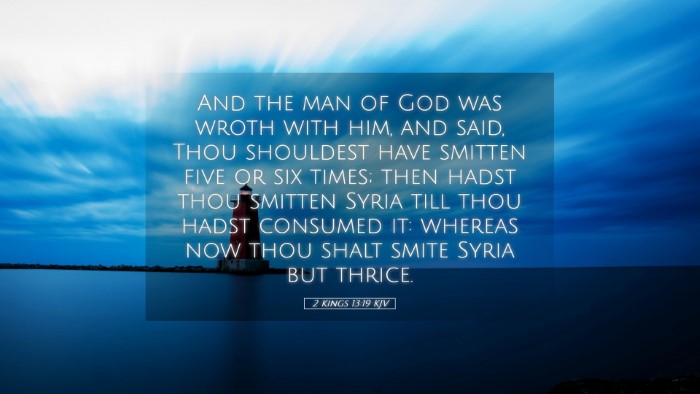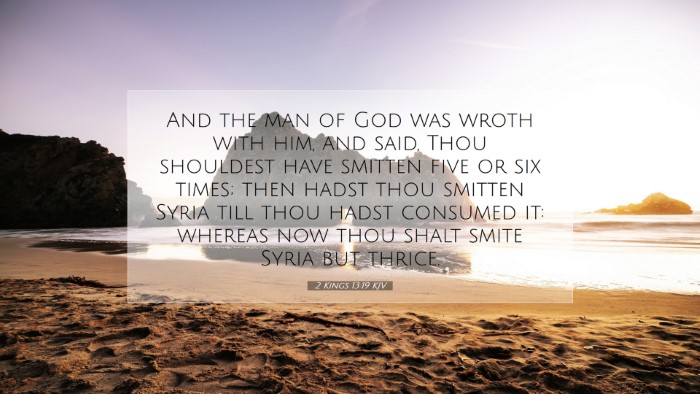Commentary on 2 Kings 13:19
Verse Context: 2 Kings 13:19 states, "And the man of God was wroth with him, and said, Thou shouldest have smitten five or six times; then hadst thou smitten Syria till thou hadst consumed it: whereas now thou shalt smite Syria but thrice."
Introduction
This verse, situated within the broader narrative of the reign of King Joash of Israel, encapsulates a significant moment of divine interaction through the prophet Elisha. The commentary on this chapter explores both the historical context and the theological implications of the king's actions in relation to God's plans for Israel and its enemies.
Understanding the Historical Context
1. The State of Israel: During the time of Joash, Israel was in a precarious situation, facing threats from Syria. Elisha, the prophet of God, was instrumental in guiding the kings of Israel during this tumultuous period. Understanding the historical backdrop allows readers to appreciate the gravity of the prophet's words as well as the directives given to Joash.
2. The Role of Prophets: Prophets served as the mouthpieces of God, providing direction and judgment. Elisha's role here is significant, as he not only conveys God’s will but also reflects God's disappointment with the king’s half-hearted response to divine instruction.
Theological Insights
1. Divine Expectations: Elisha’s rebuke of Joash carries weighty implications about human responsibility in fulfilling God's commands. Despite the king's initial willingness to participate in the battle against Syria, his limited zeal results in diminished victory. This speaks to the need for faithfulness and earnestness in following God’s call.
2. The Symbolism of Arrows: The arrows represent not merely physical weapons but also the power of faith and obedience. By striking the ground only a few times, Joash symbolically demonstrated a lack of faith in the divine promise of protection and victory. Matthew Henry emphasizes that the number of strikes correlates with the depth of one's commitment and belief in God's promises.
Interpretations from Public Domain Commentaries
1. Albert Barnes: Barnes elaborates on the significance of striking the ground, noting that the measure of God’s deliverance often correlates with human initiative and earnestness. The idea that Joash could have achieved total defeat of Syria emphasizes that God desires full and unwavering trust from His people.
2. Adam Clarke: Clarke provides a deeper insight into the emotional response of Elisha, describing it as one of righteous anger. He postulates that the prophet's frustration was not merely with Joash's actions but also with the underlying spiritual apathy that had infiltrated Israel's leadership. Clarke's commentary suggests that this interaction serves as a broader lesson on the importance of vigorous faith and active participation in God’s plans.
Lessons for Today’s Readers
1. The Call to Active Faith: For pastors and scholars, this text serves as a reminder that faith must be coupled with action. The passage reflects how God's objectives often rely on our active response. A mere initial willingness is insufficient; diligence and steadfastness in faith are necessary for completeness and fulfillment of God’s promises.
2. Understanding God’s Will: This account encourages readers to seek a deeper understanding of the will of God in their lives. Instead of settling for mediocrity in spiritual endeavors, believers are called to strive for excellence, reflecting Joash’s missed opportunity as a cautionary tale.
3. The Importance of Leadership: The encounter underscores the responsibilities of leaders within the church and society. Joash’s lack of aggressive faith reflects how leaders’ actions (or inactions) can significantly impact their people. Thus, the role of a leader is critically to model faithfulness and passion for the work God has set before them.
Conclusions
This poignant moment in 2 Kings 13:19 challenges readers to reflect on their own faith journeys. It prompts an evaluation of how deeply they engage with God's commands and the weight of their choices. The commentary from well-respected theologians like Matthew Henry, Albert Barnes, and Adam Clarke encourages a comprehensive understanding of the text's implications, emphasizing the continual need for earnest faith and active commitment to God’s purposes.


